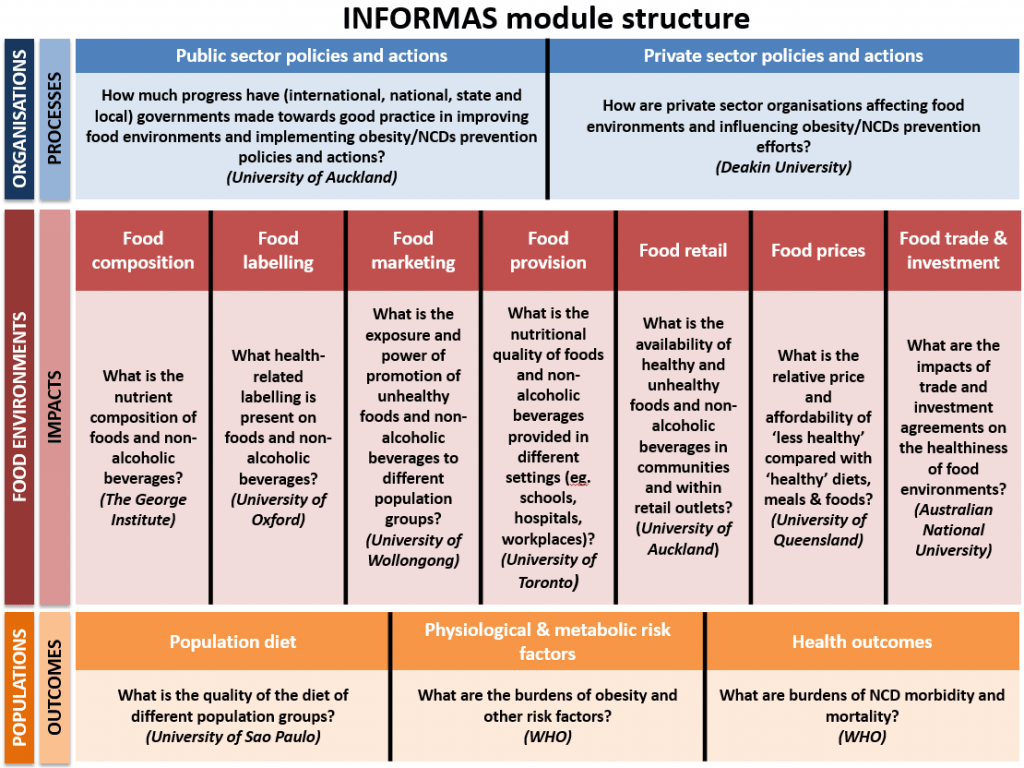Framework
The INFORMAS framework consists of 10 modules – click on a module below to learn more…
Invisible
The INFORMAS Framework
INFORMAS Monitoring Framework
Public Sector Policies and Actions (Food EPI)
Overview: How much progress have governments made towards good practice in improving food environments and implementing obesity/NCDs prevention policies and actions?
Read more about the module here
Government action is essential to increase the healthiness of food environments and reduce obesity, diet-related non-communicable diseases (NCDs), and their related inequalities.
A Government Healthy Food Environment Policy Index (Food-EPI) has been developed for INFORMAS, which comprises a ‘policy’ component with seven domains on specific aspects of food environments, and an ‘infrastructure support’ component with six domains to strengthen systems to prevent obesity and NCDs.
This module is led by the following team:
Relevant paper
Monitoring and benchmarking government policies and actions to improve the healthiness of food environments: a proposed Government Healthy Food Environment Policy Index (pages 24–37) B. Swinburn, S. Vandevijvere, V. Kraak, G. Sacks, W. Snowdon, C. Hawkes, S. Barquera, S. Friel, B. Kelly, S. Kumanyika, M. L’Abbé, A. Lee, T. Lobstein, J. Ma, J. Macmullan, S. Mohan, C. Monteiro, B. Neal, M. Rayner, D. Sanders, C. Walker and INFORMAS
Read the INFORMAS paper online here
Private Sector
Overview
The food industry plays a critical role in shaping food environments and it has an important part to play in improving population diets and addressing obesity. As part of the private sector module of INFORMAS, we seek to monitor and benchmark food industry actions, with a focus on their influence on the healthiness of food environments and efforts to improve population diets and address obesity.
Assoc. Prof. Gary Sacks (Coordinator), Deakin University, Australia. Email: Dr Gary Sacks
Relevant papers
Sacks, G.; Swinburn, B; Kraak, V; et al. (2013). A proposed approach to monitor private-sector policies and practices related to food environments, obesity and non-communicable disease prevention. Obesity Reviews 14 (S1). doi.org/10.1111/obr.12074
Sacks, G., Robinson. E., Vandevijvere, S., et al. (2019). BIA‐Obesity (Business Impact Assessment—Obesity and population‐level nutrition): A tool and process to assess food company policies and commitments related to obesity prevention and population nutrition at the national level. Obesity Reviews 20 (S2). doi.org/10.1111/obr.12878
Mialon, M., Swinburn, B., Saks, G. (2015).A proposed approach to systematically identify and monitor the corporate political activity of the food industry with respect to public health using publicly available information. Obesity Reviews, 16(7), 519-530. doi: 10.1111/obr.12289
Food Composition
Overview
What is the nutrient composition of foods and non-alcoholic beverages?
A food supply that delivers energy-dense products with high levels of salt, saturated fats and trans fats, in large portion sizes, is a major cause of non-communicable diseases (NCDs).
The INFORMAS monitoring approach seeks to systematically collect information on high-level contextual factors influencing food composition and assess the energy density, salt, saturated fat, trans fats and portion sizes of highly processed foods for sale in retail outlets (with a focus on supermarkets and quick-service restaurants).
Regular surveys of food composition are proposed across geographies and over time using a pragmatic, standardised methodology.
Module leader is
 Professor Simone Pettigrew
Professor Simone Pettigrew
Email: Simone Pettigrew
Relevant paper
Monitoring the levels of important nutrients in the food supply (pages 49–58) B. Neal, G. Sacks, B. Swinburn, S. Vandevijvere, E. Dunford, W. Snowdon, J. Webster, S. Barquera, S. Friel, C. Hawkes, B. Kelly, S. Kumanyika, M. L’Abbé, A. Lee, T. Lobstein, J. Ma, J. Macmullan, S. Mohan, C. Monteiro, M. Rayner, D. Sanders, C. Walker and INFORMAS
Read the INFORMAS paper online here
Food Labelling
Overview

Relevant paper
Monitoring the health-related labelling of foods and non-alcoholic beverages in retail settings (pages 70–81) M. Rayner, A. Wood, M. Lawrence, C. N. Mhurchu, J. Albert, S. Barquera, S. Friel, C. Hawkes, B. Kelly, S. Kumanyika, M. L’Abbé, A. Lee, T. Lobstein, J. Ma, J. Macmullan, S. Mohan, C. Monteiro, B. Neal, G. Sacks, D. Sanders, W. Snowdon, B. Swinburn, S. Vandevijvere, C. Walker and INFORMAS Read the INFORMAS paper online here
Food Promotion
Overview: What is the exposure and power of promotion of unhealthy foods and non-alcoholic beverages to different population groups?
Food and non-alcoholic beverage marketing is recognised as an important factor influencing food choices related to non-communicable diseases.
A step-wise approach, comprising ‘minimal’, ‘expanded’ and ‘optimal’ monitoring activities, has been designed for INFORMAS. This approach can be used to assess the frequency and level of exposure of population groups (especially children) to food promotions, the persuasive power of techniques used in promotional communications (power of promotions) and the nutritional composition of promoted food products.
The proposed framework supports the development of a consistent system for monitoring food and non-alcoholic beverage promotions for comparison between countries and over time.
This module is led by the following team:
Assoc. Prof. Bridget Kelly (Coordinator), University of Wollongong, Australia. Email: Dr Bridget Kelly
Relevant paper
Monitoring food and non-alcoholic beverage promotions to children (pages 59–69) B. Kelly, L. King, L. Baur, M. Rayner, T. Lobstein, C. Monteiro, J. Macmullan, S. Mohan, S. Barquera, S. Friel, C. Hawkes, S. Kumanyika, M. L’Abbé, A. Lee, J. Ma, B. Neal, G. Sacks, D. Sanders, W. Snowdon, B. Swinburn, S. Vandevijvere, C. Walker and INFORMAS
Read the INFORMAS paper online here
Read the INFORMAS Multi-Country Study Publication here
Food Provision
Overview: What is the nutritional quality of foods and non-alcoholic beverages provided in different settings (e.g. schools, hospitals, workplaces)?
The focus is on foods in schools, but the framework can also be applied to foods provided or sold in other publicly funded institutions.
Data collection and evaluation within this INFORMAS monitoring framework will consist of two components:
- In component I, information on existing food or nutrition policies and/or programmes within settings would be compiled.
- In component II, the quality of foods provided or sold in public sector settings is evaluated relative to existing national or sub-national nutrition standards or voluntary guidelines.
Module leader is Professor Mary L’Abbe

Earle W. McHenry Professor, and Chair, Department of Nutritional Sciences
Faculty of Medicine, University of Toronto
Toronto, Canada
Email: Professor Mary L’Abbe
Relevant paper
Monitoring foods and beverages provided and sold in public sector settings (pages 96–107) M. L’Abbé, A. Schermel, L. Minaker, B. Kelly, A. Lee, S. Vandevijvere, P. Twohig, S. Barquera, S. Friel, C. Hawkes, S. Kumanyika, T. Lobstein, J. Ma, J. Macmullan, S. Mohan, C. Monteiro, B. Neal, M. Rayner, G. Sacks, D. Sanders, W. Snowdon, B. Swinburn, C. Walker and INFORMAS
Read the INFORMAS paper online here
Food Retail
Overview: What is the availability of healthy and unhealthy foods and non-alcoholic beverages in communities and within retail outlets?
Retail food environments are increasingly considered influential in determining dietary behaviours and health outcomes. INFORMAS propose a step-wise framework to monitor and benchmark community and consumer retail food environments that can be used to assess:
- Density of healthy and unhealthy food outlets
- Measure proximity of healthy and unhealthy food outlets to homes/schools
- Evaluate availability of healthy and unhealthy foods in-store
- Compare food environments over time and between regions and countries
- Evaluate compliance with local policies, guidelines or voluntary codes of practice
- And determine the impact of changes to retail food environments on health outcomes, such as obesity.

Relevant paper
Monitoring the availability of healthy and unhealthy foods and non-alcoholic beverages in community and consumer retail food environments globally (pages 108–119) C. Ni Mhurchu, S. Vandevijvere, W. Waterlander, L. E. Thornton, B. Kelly, A. J. Cameron, W. Snowdon, B. Swinburn and INFORMAS Read the INFORMAS paper online here
Protocol: Food retail food availability in supermarkets
Food Prices
Overview: What is the relative price and affordability of ‘less healthy’ vs ‘healthy’ foods, meals and diets?
Food prices and food affordability are important determinants of food choices, obesity and non-communicable diseases. The monitoring of the price and affordability of ‘healthy’ and ‘less healthy’ foods and diets globally will provide robust data and benchmarks to inform economic and fiscal policy responses. A step-wise monitoring framework, including measurement indicators, has been proposed for INFORMAS:
- ‘Minimal’ data collection will assess the differential price of ‘healthy’ and ‘less healthy’ foods
- ‘Expanded’ monitoring will assess the differential price of ‘healthy’ and ‘less healthy’ diets
- And the ‘optimal’ approach will also monitor food affordability, by taking into account household income
Relevant paper
Monitoring the price and affordability of foods and diets globally (pages 82–95) A. Lee, C. N. Mhurchu, G. Sacks, B. Swinburn, W. Snowdon, S. Vandevijvere, C. Hawkes, M. L’Abbé, M. Rayner, D. Sanders, S. Barquera, S. Friel, B. Kelly, S. Kumanyika, T. Lobstein, J. Ma, J. Macmullan, S. Mohan, C. Monteiro, B. Neal, C. Walker and INFORMAS Read the INFORMAS paper online here
Food Prices Sample Protocol
Food Trade and Investment
Overview
What are the impacts of trade and investment agreements on the healthiness of food environments? The liberalisation of international trade and foreign direct investment through multilateral, regional and bilateral agreements has had profound implications for the structure and nature of food systems, and therefore, for the availability, nutritional quality, accessibility, price and promotion of foods in different locations. The proposed INFORMAS monitoring approach encompasses a set of guiding principles, recommended procedures for data collection and analysis, and quantifiable ‘minimal’, ‘expanded’ and ‘optimal’ measurement indicators to be tailored to national priorities, capacity and resources.
Relevant paper
Monitoring the impacts of trade agreements on food environments (pages 120–134) S. Friel, L. Hattersley, W. Snowdon, A.-M. Thow, T. Lobstein, D. Sanders, S. Barquera, S. Mohan, C. Hawkes, B. Kelly, S. Kumanyika, M. L’Abbe, A. Lee, J. Ma, J. Macmullan, C. Monteiro, B. Neal, M. Rayner, G. Sacks, B. Swinburn, S. Vandevijvere, C. Walker and INFORMAS Read the INFORMAS paper online here
Population Diet
Overview: What is the quality of the diet of different populations?
In order to assess the impact of food environments on population diets, it is necessary to monitor population diet quality between countries and over time. A step-wise INFORMAS framework is proposed for monitoring population diet quality:
- In the proposed ‘minimal’ approach, national trends of food and energy availability can be explored using FBaS.
- In the ‘expanded’ and ‘optimal’ approaches, the dietary share of ultra-processed products is measured as an indicator of energy-dense, nutrient-poor diets using HBES and food intake surveys, respectively.
Relevant paper
Monitoring and benchmarking population diet quality globally: a step-wise approach (pages 135–149) S. Vandevijvere, C. Monteiro, S. M. Krebs-Smith, A. Lee, B. Swinburn, B. Kelly, B. Neal, W. Snowdon, G. Sacks and INFORMAS The INFORMAS paper is available online at: http://onlinelibrary.wiley.com/doi/10.1111/obr.12082/abstract
Communication
The communication element of the INFORMAS project sets out to bring the results to the attention of the relevant stakeholders concerned with the quality of food environments, including governments and their agencies, intergovernmental bodies, commercial and trade organisations, health professionals and public health and consumer advocacy organisations.
It is intended that all the base results will be reported and made freely available, subject to confidentiality, copyright and data protection constraints. In this way, it is hoped that INFORMAS outputs can be made an open resource for broad dissemination and widespread use.
Module leader

Dr Tim Lobstein
Director of Policy
World Obesity Federation, formerly,
IASO – The International Association for the Study of Obesity
IOTF – The International Obesity TaskForce
Web: www.worldobesity.org
Email: tlobstein@worldobesity.org
Relevant papers
1. INFORMAS and advocacy for public health nutrition and obesity prevention (pages 150–156) T. Lobstein, H. Brinsden, J. Landon, V. Kraak, A. Musicus and J. Macmullan – available online
2. Monitoring policy and actions on food environments: rationale and outline of the INFORMAS policy engagement and communication strategies (pages 13–23) H. Brinsden, T. Lobstein, J. Landon, V. Kraak, G. Sacks, S. Kumanyika, B. Swinburn, S. Barquera, S. Friel, C. Hawkes, B. Kelly, M. L’Abbé, A. Lee, J. Ma, J. Macmullen, S. Mohan, C. Monteiro, B. Neal, M. Rayner, D. Sanders, W. Snowdon, S. Vandevijvere, C. Walker and INFORMAS – available online
Module Leaders
A list of INFORMAS module leaders can be viewed here.
